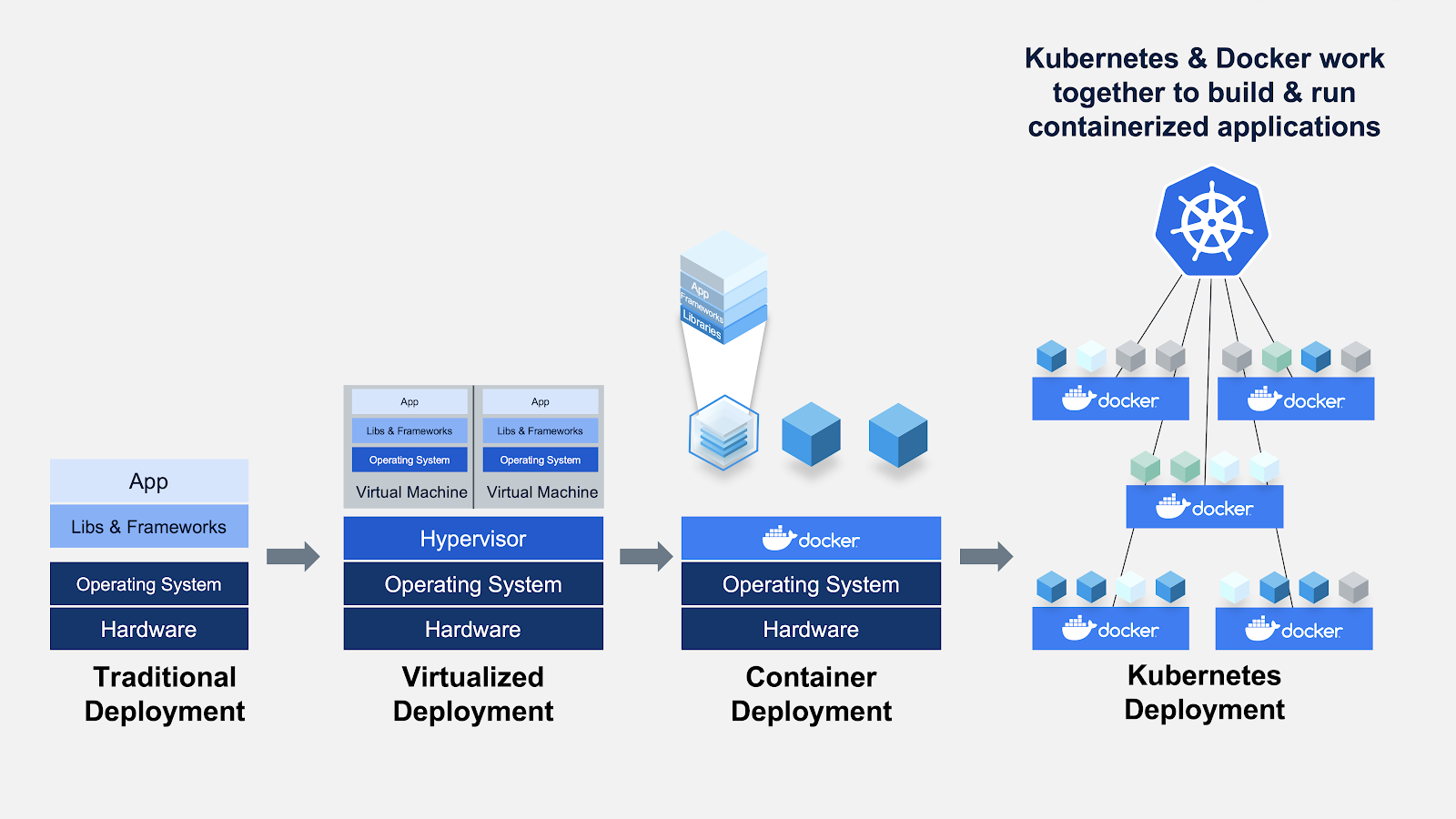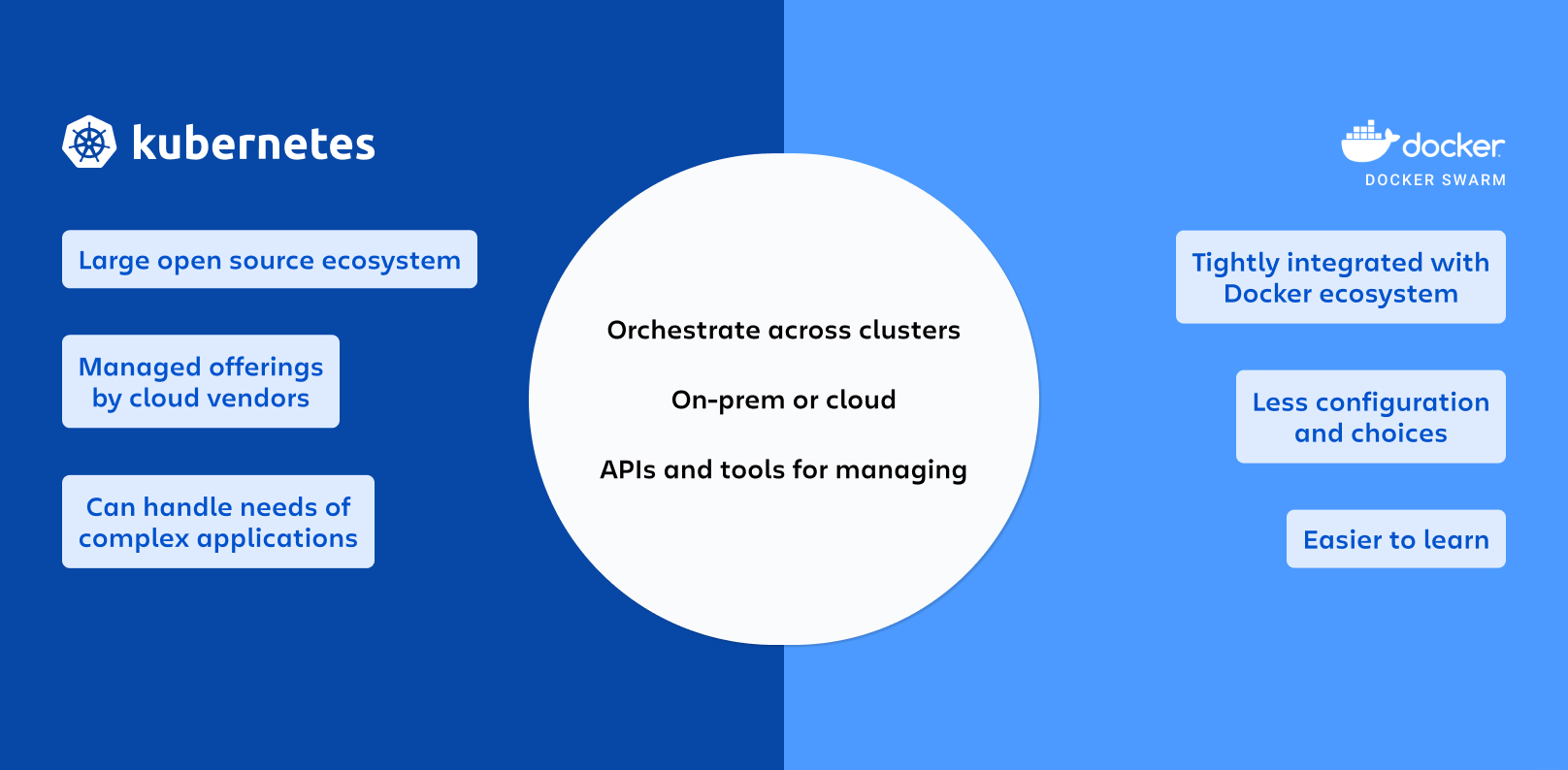Antwort When to use Kubernetes instead of Docker? Weitere Antworten – Why we use Kubernetes instead of Docker

Docker containers are one process per container. Kubernetes is particularly useful for DevOps teams since it offers service discovery, load balancing within the cluster, automated rollouts and rollbacks, self-healing of containers that fail, and configuration management.Docker is one of the platforms used for containerization but it is not the only platform out there. This means, as long as you have a container runtime, Kubernetes will do its job. You can choose that container runtime to be Docker, but it's not a requirement.When You Should Use Kubernetes
- Multi-tenant applications. Applications designed to serve multiple customers from a single app instance (e.g., CRM software, cloud-based storage, customer service platforms, etc.)
- Analytics and big data.
- High-performance computing (HPC).

When would you not use Kubernetes : Moreover, if your application stack is simple, not distributed, or doesn't require advanced features like auto-scaling, self-healing, and service discovery, Kubernetes might be an overkill. Its complexity and overhead may lead to more problems than solutions.
Is Kubernetes or Docker better
Docker provides basic networking capabilities, allowing containers to communicate with each other and the host system. However, Kubernetes offers a more advanced networking model, providing service discovery, load balancing, and network policies out of the box.
What are the pros and cons of Kubernetes vs Docker : Kubernetes vs Docker
| Kubernetes | Docker |
|---|---|
| It supports auto-scaling of the container in a cluster. | Docker does not support auto-scaling. |
| The health check is of two kinds: liveness and readiness. | Health checks are limited to service. |
| Hard to set up and configure. | Docker's setup and installation are easy. |
Docker has been the big name when it comes to building and running containers, and Kubernetes has been the big name when it comes to managing and orchestrating them. It might seem a bit shocking to hear that Kubernetes is deprecating support for Docker as a container runtime starting with Kubernetes version 1.20.

Installation, configuration, and learning curve
Docker Swarm is simple to install compared to Kubernetes, and instances are usually consistent across the OS. It is easier to learn than Kubernetes, and works with the existing CLI. Configuring a cluster in Docker Swarm is easier than configuring Kubernetes.
Is Kubernetes still relevant 2024
In the 2024 Kubernetes Benchmark Report, Fairwinds analyzed more than 330,000 workloads, reviewing data from hundreds of organizations. The latest report shows Kubernetes users have significantly improved workload efficiency and reliability, though areas for improvement remain.Is Kubernetes necessary for personal/minor Docker usage It's not necessary, no. But it might be a good idea. If you are sure your project will stay local to your development machine — it's a local application, or going into a CI build — then sure, write a docker compose file.Disadvantages: Despite its numerous advantages, Kubernetes also poses some challenges: 1. Complexity: Kubernetes has a steep learning curve and requires expertise in containerization, networking, and distributed systems, making it challenging for inexperienced users to deploy and manage effectively.

15 Common Kubernetes Pitfalls & Challenges
- Deploying Containers With the “Latest” Tag.
- Not Using Liveness and Readiness Probes.
- Broken Pod Affinity/Anti-Affinity Rules.
- Forgetting Network Policies.
- No Monitoring/Logging.
- Label Selector Mismatches.
- Service Port Mismatches.
- Using Multiple Load Balancers.
What is Kubernetes best suited for : Six top Kubernetes use cases
- Large-scale app deployment. Heavily trafficked websites and cloud computing applications receive millions of user requests each day.
- High-performance computing.
- AI and machine learning.
- Microservices management.
- Hybrid and multicloud deployments.
- Enterprise DevOps.
Should I learn Docker or Kubernetes : Docker is about creating and managing containers and minimizing the time between writing and deploying the code. On the other hand, Kubernetes is preferred when the developer needs to work on a huge amount of containers on different systems. Connect with ThinkSys to know about different DevOps Services offered.
Why is everyone moving to Kubernetes
Scalability and flexibility: Kubernetes provides advanced scalability features, allowing efficient management of large clusters and the ability to scale applications horizontally. It supports automatic scaling based on metrics, which enables better utilization of resources and improved application performance.

Docker is a platform to build, run, and store container images, whereas Kubernetes is a container orchestration system.To overcome these challenges, NASA has deployed LIS using Docker containers, which allows installing an entire software package, along with all dependencies, within a working runtime environment, as well as Kubernetes, which orchestrates the deployment of a cluster of containers.
What are the disadvantages of Kubernetes : Disadvantages: Despite its numerous advantages, Kubernetes also poses some challenges: 1. Complexity: Kubernetes has a steep learning curve and requires expertise in containerization, networking, and distributed systems, making it challenging for inexperienced users to deploy and manage effectively.

![csm_2405-bauerfeind-produktkategoriesseiten-bandagen-ellenbogenbandage-2560x1400_88-1_f91f66009c[1]](https://www.nakajimamegumi.com/wp-content/uploads/2024/06/csm_2405-bauerfeind-produktkategoriesseiten-bandagen-ellenbogenbandage-2560x1400_88-1_f91f66009c1-1024x521-65x65.jpg)
![Ischiasschmerzen[1]](https://www.nakajimamegumi.com/wp-content/uploads/2024/06/Ischiasschmerzen1-1024x640-65x65.jpg)
![csm_blogbeitrag_autoimmunerkrankung_d307ac8b72[1]](https://www.nakajimamegumi.com/wp-content/uploads/2024/06/csm_blogbeitrag_autoimmunerkrankung_d307ac8b721-1024x576-65x65.jpeg)